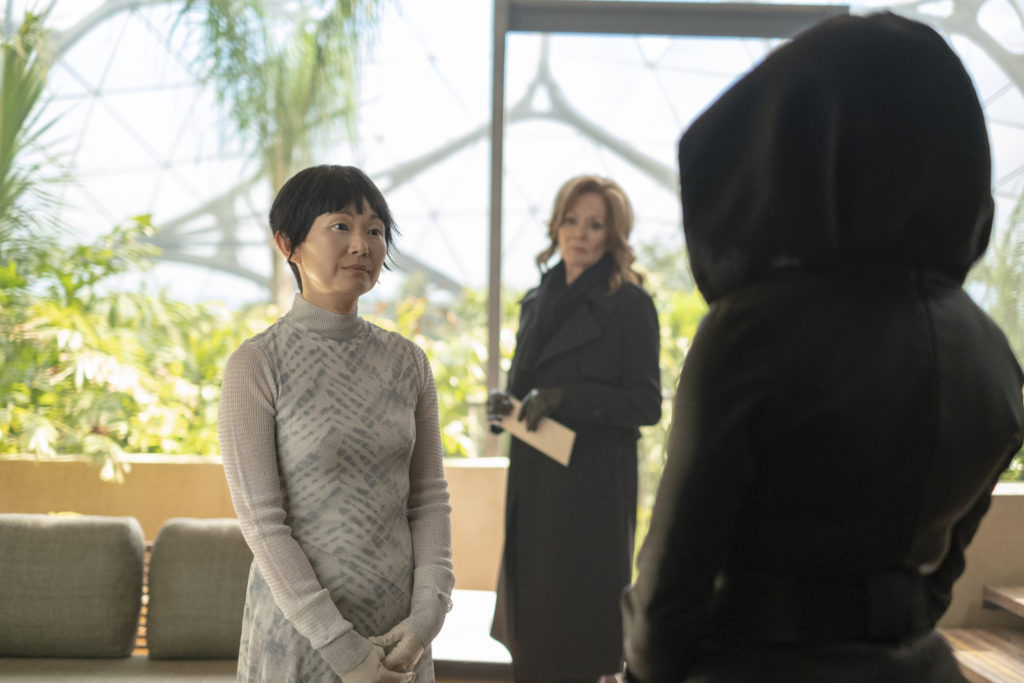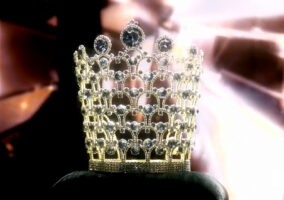 Off-blog events (aka life) prevented us from getting to a review of last week’s episode, but we simply must pay some attention to the opening five minutes of “If You Don’t Like My Story Write Your Own,” which introduced Hong Chau as the unforgettable Lady Trieu, growing a baby for a couple so she can snatch their land from them just in time for her to claim ownership of whatever crashed onto said land from outer space. There’s so much to unpack about just that opening scene alone — not least being the second allusion of the series to the Superman origin story. The kindly childless couple with the farm were named the Clarks, in an echo of Superman’s adoptive parents, while Will Reeves’ origin story had him smuggled out of catastrophe by his parents just before they and everyone around them died, in an echo of Superman’s biological parents. Then there are the various ways Lady Trieu is clearly modeling herself on Adrian Veidt, not least of which was her callback to his infamous “I did it 35 minutes ago” line from the original comic. Or the allusion that her daughter is a clone being fed her mother’s memories for some reason. Whatever’s going on with her, she makes the third woman in the cast with a fantastic introduction and memorable portrayal. The scene with Chau, Jean Smart and Regina King together was one of the best of the series so far – especially when Angela and Lady Trieu traded barbs in Vietnamese. Given the revelation that Adrian himself is trying to escape a prison on what appears to be one of the moons of Mars as well as the implication that all of his scenes are taking place on a different time scale from the rest of the story, it seems fairly likely that whatever crash-landed on the Clarks’ farm more than likely has something to do with his impending escape.
Off-blog events (aka life) prevented us from getting to a review of last week’s episode, but we simply must pay some attention to the opening five minutes of “If You Don’t Like My Story Write Your Own,” which introduced Hong Chau as the unforgettable Lady Trieu, growing a baby for a couple so she can snatch their land from them just in time for her to claim ownership of whatever crashed onto said land from outer space. There’s so much to unpack about just that opening scene alone — not least being the second allusion of the series to the Superman origin story. The kindly childless couple with the farm were named the Clarks, in an echo of Superman’s adoptive parents, while Will Reeves’ origin story had him smuggled out of catastrophe by his parents just before they and everyone around them died, in an echo of Superman’s biological parents. Then there are the various ways Lady Trieu is clearly modeling herself on Adrian Veidt, not least of which was her callback to his infamous “I did it 35 minutes ago” line from the original comic. Or the allusion that her daughter is a clone being fed her mother’s memories for some reason. Whatever’s going on with her, she makes the third woman in the cast with a fantastic introduction and memorable portrayal. The scene with Chau, Jean Smart and Regina King together was one of the best of the series so far – especially when Angela and Lady Trieu traded barbs in Vietnamese. Given the revelation that Adrian himself is trying to escape a prison on what appears to be one of the moons of Mars as well as the implication that all of his scenes are taking place on a different time scale from the rest of the story, it seems fairly likely that whatever crash-landed on the Clarks’ farm more than likely has something to do with his impending escape.

But that will have to be a story for another day, because this week’s story was all about the detective code-named Looking Glass. While there are clear allusions to Rorschach being made with him – not least his extreme paranoia and tendency to eat beans straight from the can – it’s also clear that Wade has none of the extreme political views of his predecessor in mask-wearing. If anything, Wade’s life is a rebuke to the earlier character’s; a pursuit not of extremeness, but of calm and equilibrium. A burning desire to help the world not through violence, but through counseling and comfort. Sure, he’s clearly suffering from a hero complex of sorts, and there’s no denying he’s burdened with decades of seemingly untreated post-traumatic stress disorder (both which made him such an easy target for the Kavalry), but Wade is a good, but sad man suffering under a terrible weight rather than a violence-prone vigilante. He was once a young man intent on saving the souls of sinners and now he’s an aging man obsessed with saving those who suffer like he does. No matter which direction his life had taken, it seems Wade was always going to be the guy who tries to save everyone. He’s in the mode of a classic Alan Moore-ian take on superheroes – broken people with enormous issues hiding behind masks – but without the destructive or megalomaniacal tendencies. A gentle broken hero. And that’s before the Kavalry and Senator Keene got their hands on him and broke him even further.
Any thoughts that the series would somehow exist separate from or alongside the original material has been forever banished in these last couple of episodes, but nothing drove that point home more than doing something not even Zack Snyder attempted in his rather too-literal 2009 film of Watchmen. They showed the damn squid in all its ridiculous, horrifying glory. It’s something of a clever trick on Damon Lindelof’s part. He started by putting a spotlight on America’s history of racist violence and slowly, with each episode, made the world surrounding that initial set of themes and questions into something more and more outrageous and fantastical. The blue dildo was just a tease (you’ll pardon the phrasing). We’re in full on prisons-on-Mars and giant telepathic squids territory now. Hope you buckled your seatbelt.

We bring up Snyder’s version of the story because it struck us with this episode how much of a point Lindelof is making not only about the original material, but about how to adapt material that’s largely considered difficult if not impossible to adapt. Rather than taking a literal approach, he’s taken an extrapolative one that allows him to refer back to the original story as much as he likes while moving it in a new direction at the same time. The result has been a series that feels way more like the original comic than the word-for-word replication of Snyder’s film. Lindelof has given himself the space to explore the full repercussions of the original tale, not just through the deeply troubling changes to the American political system and the revelations of a thirty-year hoax on the public, but by showing how entire lives – small lives or unremarkable lives – can be forever changed, forever damaged by the goings-on in your average big, dumb superhero story. Yes, Looking Glass is a reflection of America in this tale and that’s perhaps a bit too on-the-nose when it comes to symbolism (we’re all paranoid and obsessed with conspiracy theories, it seems), but Wade’s life – and Tim Blake Nelson’s heartbreaking portrayal of him – slot so well into the original themes and outcomes of the original book that they feel more like the OG Watchmen than the OG Watchmen at times.
Whatever the story is now – and we admit to only having a bare-bones understanding of everything that’s going on – it’s clearly about more than racism, more than colonialism, more than vigilantism and more than nihilism. It’s still about all those things, but it’s also about telephones to Mars, and psychic sea life the size of skyscrapers, and X-ray glasses, and racism detectors, and pills that give you someone else’s memories. More than almost any other superhero adaptation every attempted, this version of Watchmen is as much about the very real issues facing the world as it is about creating a world of bizarre and infinite possibilities around those issues. That push-pull of the fantastical and the disturbingly mundane is part of what’s making this show so completely engrossing.
Céline Dion Out and About in NYC in Chanel Next Post:
Netflix’s “The Crown” Season 3 AFI Fest Premiere
Please review our Community Guidelines before posting a comment. Thank you!



